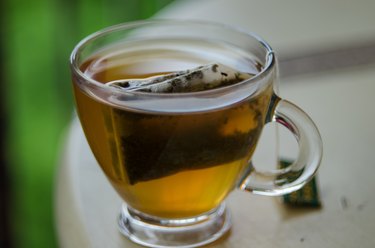
Can taking herbs to lower triglycerides be a natural way to reduce your total cholesterol number? Herbal supplements are products made from plants. Some commonly used herbs may help reduce triglycerides or total cholesterol, according to Johns Hopkins Medicine.
Video of the Day
Video of the Day
Some Promising Signs
"Doctors will usually tell you that we need better studies before we can say that herbal supplements can lower triglycerides or cholesterol, which is true. However, I have seen some good results with my patients using herbal and other natural supplements," says Neel L. Shah, MD, an associate professor of endocrinology at McGovern Medical School, part of UTHealth in Houston.
According to the American Heart Association, triglycerides are the form by which most fats float in your blood and exist in your foods. High levels of triglycerides increase your total cholesterol, and they are linked to heart disease and diabetes.
Herbal Medicine in Ayurveda
Ayurvedic medicine, called Ayurveda, goes back more than 3,000 years, according to Johns Hopkins Medicine. In India, Ayurveda is considered equal to Western medicine. Ayurveda relies heavily on herbs, along with a healthy lifestyle. Ayurvedic health care providers are not licensed in the United States, but they are becoming more common.
The U,S. does have licensed doctors of naturopathic medicine, who have experience with herbal medicine, Johns Hopkins notes.
The Best Evidence for Herbs
The National Institutes of Health recognizes that there is great interest in natural treatments for diseases, and it has information on natural products for cholesterol at the National Center for Complementary and Integrative Health (NCCIH). This is what the science says on herbal supplements for blood fats and cholesterol:
Flaxseed. Studies on flaxseed supplements, including flaxseed oil, are mixed, but there's some evidence that they may lower cholesterol, especially in people with high cholesterol levels. Flaxseed and flaxseed oil are generally safe but should be avoided during pregnancy.
Garlic. Taking a garlic supplement for two months may modestly lower cholesterol. Other than affecting your breath and body odor, garlic is safe. Johns Hopkins Medicine also supports garlic to lower cholesterol and triglycerides.
Green tea. There have been many studies on green tea. The research indicates that it may lower total cholesterol. Concentrated green tea may cause liver problems in some people, and most green tea does have caffeine, says NCCIH. Johns Hopkins Medicine also recommends this herb for lowering cholesterol.
Oats and oat bran. Several studies support the supplement of bran fiber to lower cholesterol at about three grams a day.
Soy. There have been many studies that show soy foods or soy supplements can lower blood fats. The most common side effect from soy is an upset stomach.
Stanols and sterols. Studies show that these plant supplements, taken with meals, can reduce cholesterol levels, says NCCIH. Plant sterols are considered safe but may cause diarrhea in some people.
The U.S. Food and Drug Administration says you should check with a qualified health care provider before taking any supplement. Remember, many herbs have side effects, and they may interfere with medications you are taking. None of the supplements tested in research are as reliable or effective as medications.
Red Yeast Rice
According to NCCIH, this herbal supplement deserves its own section because the FDA has determined that it contains enough of the active ingredient in the statin drug lovastatin to be considered an unregulated drug.
The FDA has said that it is not legal to sell red yeast rice as a supplement. Red yeast rice may also be contaminated by a substance called citrinin that may cause kidney damage. The NCCIH advises against its use.
Other Natural Options
"A natural supplement that has good support in research, but is not an herb, is omega-3 fats in fish oil," says Dr. Shah. Omega-3 is also supported for lowering triglycerides by Harvard Health Publishing. The recommendation is to eat fish with high omega-3 fats (salmon, tuna, sardines) twice a week to lower triglycerides.
Finally, don't forget that just as in Ayurveda, U.S. doctors also recommend a healthy lifestyle for lowering your triglycerides. According to Harvard Health Publishing, the American Heart Association and Dr. Shah, this includes:
- Avoiding saturated and trans fats.
- Avoiding a diet very high in carbohydrates.
- Avoiding processed food.
- Avoiding or limiting alcohol.
- Losing weight or maintaining a healthy weight.
- Getting plenty of exercise.
- Not smoking.
- Johns Hopkins Medicine: "Herbal Medicine"
- American Heart Association: "What Your Cholesterol Numbers Mean"
- Johns Hopkins Medicine: "Ayurveda"
- National Center for Complementary and Integrative Health: "High Cholesterol and Natural Products: What the Science Says"
- Neel L. Shah, MD, associate professor, endocrinology, McGovern Medical School, UTHealth, Houston, Texas
- U.S. Food and Drug Administration: "Tips for Dietary Supplement Users"
- NCCIH: "Red Yeast Rice"
- Harvard Health Publishing: "Should You Be Taking an Omega-3 Supplement?"
Is this an emergency? If you are experiencing serious medical symptoms, please see the National Library of Medicine’s list of signs you need emergency medical attention or call 911.